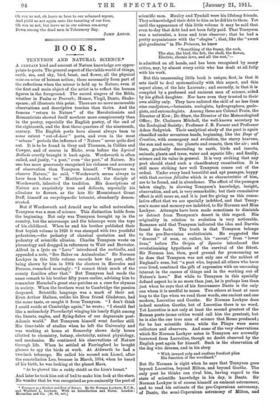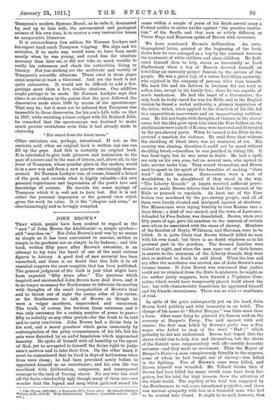BOOKS•
TENNYSON AND NATURAL SCIENCE:* A CERTAIN kind and amount of Nature knowledge are appro- priate to poets. The general aspect of the visible world of things, earth, sea, and sky, bird, beast, and flower, all the physical raise-en-scSne of human action; these necessarily form part of the reflections when the mirror is held up to Nature, even if the first and main object of the artist is to reflect the human figures in the foreground. The sacred singers of the Bible, whether in Psalm or Proverb; Homer, Virgil, Dante, Shake- speare; all illustrate this point. There are no more memorable observations and descriptive touches than theirs. And the famous "return to Nature" of the Revolutionists and Romanticists showed itself nowhere more conspicuously than in the poetry, especially the English poetry, of the end of the eighteenth, and the first three-quarters of the nineteenth, century. The English poets have almost always been to some extent " out-of-door " poets, and even in the most " urbane " periods the influence of " Nature " never quite died out. It is to be found in Gray and Thomson, in Collins and Cowper, and of course in Blake, even before the Lyrical Ballads overtly brought it back again. Wordsworth is often called, and justly, " a poet," even " the poet," of Nature. No one has more generously recognised his richness and accuracy of observation than Tennyson himself. " Whenever we observe Nature," he said, " Wordsworth seems always to have been before us." Matthew Arnold, the disciple of Wordsworth, inherited the tradition. His descriptions of Nature are exquisitely true and delicate, especially his allusions to flowers, as the late Sir Mountstuart Grant Duff, himself an encyclopaedic botanist, abundantly demon- strated.
But if Wordsworth and Arnold may be called naturalists, Tennyson was a man of science. This distinction holds from the beginning. Not only was Tennyson brought up in the country, but the microscope and the telescope were the toys of his childhood. When he and his brother published their first boyish volume in 1826 it was stamped with two youthful pedantries,—the pedantry of classical quotation and the pedantry of scientific allusion. Charles Tennyson wrote on phrenology and dragged in references to Watt and Brewster. Alfred in a lyric on "Love" introduced the vorticella, and appended a note, "See Baker on Animalculae." Sir Norman Lockyer in this little volume records how the poet, after being shown by him in 1864 the clusters in Hercules and Perseus, remarked musingly: "I cannot think much of the county families after that." But Tennyson had made the same remark to his brother fifty years earlier, advising him to remember Herschel's great star-patches as a cure for shyness in society. When the brothers went to Cambridge the passion deepened. Scientific language was a mark of their set. Even Arthur Hallam, unlike his Eton friend Gladstone, had the same taste, or caught it from Tennyson. "I don't think I could reside at Cambridge again," he wrote ; " I should feel like a melancholy Pterodactyl winging his lonely flight among the linnets, eagles, and flying-fishes of our degenerate post- Adamic world." But Tennyson himself went further still. His time-table of studies when he left the University and was working at home at Somersby shows daily hours allotted to chemistry, botany, electricity, animal physiology, and mechanics. He continued his observations of Nature through life. When he settled at Farringford he bought glasses to spy the birds at work. At Aldworth he had a two-inch telescope.. He called his second son Lionel, after the constellation Leo, because in March, 1854, when he heard of his birth, he was looking at the planet Mars,
As he glowed like a ruddy shield on the Lion's breast."
And later he took him out of bed to make him look at the stars. No wonder that he was recognised as pre-eminently the poet of
• Tennyem as a Student and Poet of Nature. By Sir Norman Lockyer, R.C.B., and Winifred L. Lockyer. With an Introduction and Notes. London : Macmillan and Co. 14e. 6d. net.] scientific men. Huxley and Tyndall were his lifelong friends. They acknowledged their debt to him as he did his to them. Yet until the appearance of this little volume it may be said that even to-day that debt had not been fully paid. That Tennyson was a naturalist, a keen and true observer; that he had a. pretty acquaintance with the "ologies"; that, like the "sweet girl-graduates" in The Princess, he knew "Something of the frame, the rock, The star, the bird, the fish, the shell, the flower, Electric, chemic laws, and all the rest,"—
is admitted on all hands, and has been recognised by many critics, nay, by almost every critic who has dealt at all fully with his work.
But this unassuming little book is unique, first, in that it. sets itself to deal systematically with this aspect, and this. aspect alone, of the late Laureate ; and secondly, in that it is compiled by a professed and eminent man of science, aided by his gifted daughter. Nor have even they trusted to their own ability only. They have enlisted the skill of no less than nine coadjutors,—botanists, zoologists, hydrographers, geolo- gists, and entomologists. Among these are Colonel Frain, the Director of Kew ; Dr. Shaw, the Director of the Meteorological Office; Dr. Chalmers Mitchell, the well-known secretary to- the Zoological Society; Professor J. B. Farmer and Professor Adam Sedgwick. Their analytical study of the poet is again
classified under seventeen heads, beginning, like the Days of Creation, with cosmogony and evolution, the starry heavens,.
the sun and moon, the planets and comets, then the air; and then, gradually descending to earth, birds and insects, animals, plants and trees, water and aquatic life ; and finally, science and its value in general. It is very striking that any poet should stand such a classificatory examination. It is still more striking how well Tennyson comes out of the ordeal. Under every head beautiful and apt passages, happy with that curiosa felicitas which is so characteristic of him, are to be found, and in abundance. The effect of the passages taken singly, in showing Tennyson's knowledge, insight,
observation, and art, is very remarkable; but their cumulative effect is still more so, and it is just for giving us this cumu- lative effect that we are specially indebted, and that Tenny- son's name and memory are indebted, to Sir Norman and Miss. Lockyer. Attempts have been made sometimes to diminish, or detract from Tennyson's desert in this regard. His originality in relation to evolution is very noticeable. Romanes said that Tennyson indicated the idea and Darwin found the facts. The truth is that Tennyson belongs to the pre-Darwinian evolutionists. He suggested the " descent " of man, or, rather, his "ascent," from "lower
lives," before The Origin of Species introduced the revolutionising hypothesis of the survival of the fittest. Sir Norman has, then, good ground for pronouncing as. he does that Tennyson was not only one of the noblest of England's sons, but "a poet who, beyond all others who have
ever lived, combined the gift of expression with an unceasing interest in the causes of things and in the working out of Nature's laws." But while to Tennyson in this specially defined aspect he is no more than just, he is perhaps less than just when he says that of his forerunners Dante is the only one whom it is needful to name. Two others at least at once leap to the lips when we read these words, one ancient and one modern, Lucretius and Goethe. Sir Norman Lockyer does indeed mention Goethe, but of Lucretius there is no word. Yet Lucretius is not only at least the second greatest of the Roman poets (some critics would call him the greatest), but he is also the one true man of science that Rome produced; for he has scientific ideas, while the Plinys were mere collectors and observers. And some of the very observations which Sir Norman Lockyer notes in Tennyson are avowedly borrowed from Lucretius, though no doubt observed by the English poet again for himself. Such is the observation of the dog who dreams, and in his sleep
" With inward yelp and restless forefoot plies His function of the woodland."
But Sir Norman is right when he says that Tennyson goes beyond Lucretius, beyond Milton, and beyond Goethe. The only poet he thinks can rival him, having regard to the state of scientific knowledge in his day, is Dante. Sir Norman Lockyer is of course himself an eminent astronomer, and to read his estimate of the pre-Copernican astronomy, of Dante, the semi-Copernican astronomy of Milton, and Tennyson's modern Systema Mundi, as he calls it, dominated by, and up to date with, the astronomical and geological science of his own time, is to receive a very instructive lesson in comparative literature.
It is extraordinary bow seldom Sir Norman Lockyer and his expert band catch Tennyson tripping. His slips and his mistakes, if he made any, would seem to have been made mostly when he was young, and cared less for absolute accuracy than later on, or did not take so much trouble to 'verify his references and check his authorities, living or literary. Not less striking are the multitude and variety of 'Tennyson's scientific allusions. Those cited in these pages enust number at least a thousand. And yet the book is not 'uite exhaustive. It would not be difficult to add a few, perhaps more than a few, similar citations. One addition ought perhaps to be made. Si Norman Lockyer says that there is no evidence in the poems that the poet followed the 'discoveries made since 1868 by means of the spectroscope. That may be; but it must not be inferred that Tennyson was insensible to these discoveries, for his son's Life tells us that in 1887, while watching a lunar eclipse with Sir Richard Jebb, be remarked that the spectroscope was destined to make much greater revelations even than it had already made in charming "Her secret from the latest moon."
Other omissions are, perhaps, intentional. If not, as the ancients said, when an original book is written any one can fill up the gaps. And this is certainly an original book. It is calculated to give both pleasure and instruction to the man of science and to the man of letters, and, above all, to the lover of Tennyson, whose peculiar place in the modern world is in a new way and from a new quarter convincingly demon- strated. Sir Norman Loekyer was, of course, himself a friend of the poet, and records what is highly valuable,—his own personal experiences and impressions of the poet's love and knowledge of science. He records too some sayings of Tennyson which it is well not to have lost. But it is not either the personal impression or the general view which gives the work its value. It is the " chapter and verse," so discriminatingly and so lovingly compiled.











































 Previous page
Previous page